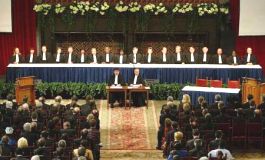EU, US dispute over ICC hinders joint efforts on Darfur
By Sonni Efron, The Los Angeles Times
WASHINGTON, Feb 26, 2005 — A dispute between the Bush administration and European allies over whether to allow the International Criminal Court to try Sudanese war crimes suspects is complicating efforts to resolve the crisis in the Darfur region, diplomats and activists said Friday.

|
|
Inaugural ceremony of International Criminal Court in The Hague, March 11, 2003. (Reuters). |
The European Union this month called for the U.N. Security Council to give the International Criminal Court jurisdiction to try those responsible for atrocities in Darfur. The ICC, based in The Hague, was set up in 2002 to try cases of war crimes, genocide and crimes against humanity. Ninety-seven countries are members.
The Bush administration opposes the ICC and has said it does not want to legitimize the court by allowing it to prosecute those responsible for what the United States calls genocide in Darfur. Instead, the administration wants to set up an ad hoc war crimes tribunal in East Africa, run jointly by the African Union and the United Nations.
The issue is coming to a head at the Security Council, which is considering a U.S.-drafted resolution to put 10,000 U.N. peacekeepers as well as 715 civilian police in southern Sudan to monitor a cease-fire there. The resolution also would give the peacekeepers the right to protect civilians from violence in the 23-month-old conflict.
Lawmakers and diplomats said the U.S.-European dispute over the ICC, as well as Russian and Chinese objections to imposing sanctions on the government of Sudan, have created a bottleneck that could delay U.N. action for weeks – at a time when an estimated 320 people are dying in Darfur each day.
Sen. Sam Brownback (R-Kan.) said the dispute over who should try war crimes suspects is distracting policymakers from the real issues.
“Every day you debate, you get more people dying,” Brownback said. “We need to bring the debate to how to get African Union troops on the ground and real sanctions to bring pressure on [the Sudanese government] now.”
Moreover, while the diplomatic wrangling continues, a massive famine is looming, activists said.
“The only thing worse than genocide is genocide followed by famine, and that is what we are looking at now,” said John Prendergast of the International Crisis Group.
The Bush administration opposes the ICC because it fears the court could be used to prosecute U.S. military personnel and government officials.
Pierre-Richard Prosper, the U.S. ambassador-at-large for war crimes, says differences of opinion over judicial accountability in Darfur should be put aside if necessary while the Security Council considers sending peacekeepers.
However, Prosper said, the administration is opposed to “justice in Africa being outsourced or exported” to the Netherlands.
“Is this the message that we want to send to the African continent, that whenever there’s a problem ? justice has to be exported to The Hague? We say no,” Prosper, a former U.N. war crimes prosecutor, said at a Brookings Institution conference.
A court in Tanzania, where a U.N. tribunal is trying alleged war criminals from the 1994 Rwanda massacres, should be expanded to handle the Darfur cases, Prosper argued. Eventually, the tribunal could be turned into a permanent African institution whose presence would serve as a deterrent to war crimes, he said.
If the ICC does try the Darfur cases, Prosper said, it will have to do so without U.S. help.
European diplomats and human rights activists argued that the ICC could set up a courtroom anywhere in the world, including in Chad, where many of those who fled Darfur are living in refugee camps. Unlike ad hoc tribunals, which are set up for a limited time, the ICC is a permanent institution that can pursue those responsible for genocide for the rest of their lives, they said.
The United States has done more than any other nation to try to end the atrocities in Darfur, said Elissa Massimino, Washington director of Human Rights First. But she said it was “tragic” that its ideological opposition to the ICC was becoming an obstacle.
